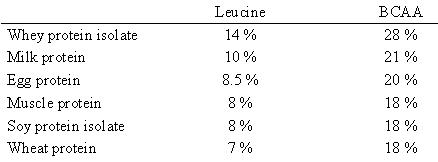Reducing calorific intake, while changing neither the quality of the food or the macronutrient ratios, is still the most commonly offered advice for weight loss. However, research suggests that altering macronutrient ratios can have a substantial impact on the amount of and type of weight lost in a calorie restricted diet. Research has shown inconsistent results from reductions in carbohydrate and fat levels in diets, and when the relative amounts of calories from both macronutrients are equal, there appears to be a minimal effect on the outcome of weight loss. However, increasing the protein content of a restricted calorie diet does appear to provide a number of benefits. In particular, high protein diets increase satiety, increase thermogensis and improve glycaemic control. More importantly, increasing protein ratios provide the benefit of reducing muscle tissue breakdown.
Protein in the diet provides 20 amino acids, 8 of which are essential to good health as they cannot be synthesised in the body. The essential amino acids have many metabolic functions and also contribute to the basic needs of protein turnover. This role in protein turnover is fairly well understood and research has started to focus on the role played by a sub-group of the essential amino acids called the branched chain amino acids (BCAA). The role of the BCAA (leucine, isoleucine and valine) in muscle protein turnover is different from other essential amino acids because during periods of calorie restriction the BCAA, in particular leucine, stimulate muscle protein synthesis. For example, it has been shown that leucine supplementation stimulates muscle protein synthesis after exercise and during calorie restriction.
Leucine is able to stimulate protein synthesis because it can regulate the insulin signalling pathways inside cells via stimulation of the mTOR kinase. This protein is a downstream element of the normal phosphoinositde 3-kinase pathway stimulated by insulin binding to the insulin receptor, which stimulation of results in protein synthesis. Leucine is therefore able to stimulate protein synthesis during times when insulin levels are low, which might occur during times of calorie restriction or following exercise. The leucine content of dairy products is generally high, with whey protein being a rich source of all of the BCAA (figure 1). Whey protein supplementation is therefore the recommended source of BCAA on calorie restricted weight loss diet because of the sparing effect that it has on muscle, along with its low fat, low carbohydrate composition.
Figure 1. The leucine and BCAA content of various foods. Values represent g of amino acids per 100 g of protein1.
RdB

